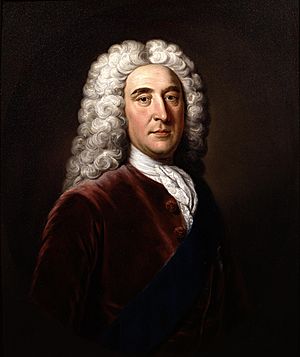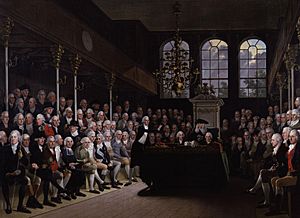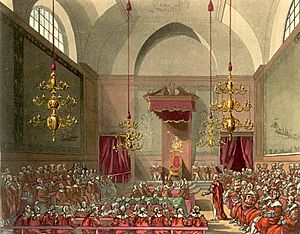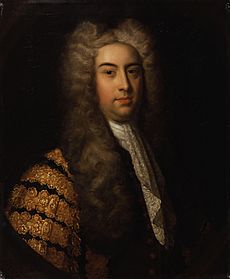11th Parliament of Great Britain facts for kids
Quick facts for kids 11th Parliament of Great Britain |
|||||||||||||||||
|---|---|---|---|---|---|---|---|---|---|---|---|---|---|---|---|---|---|
|
|||||||||||||||||

The Duke of Newcastle was prime minister during most of the Eleventh Parliament
|
|||||||||||||||||
| Overview | |||||||||||||||||
| Meeting place | Palace of Westminster | ||||||||||||||||
| Term | 31 May 1754 – 20 March 1761 | ||||||||||||||||
| Election | 1754 general election | ||||||||||||||||
| Government | |||||||||||||||||
| House of Commons | |||||||||||||||||
 |
|||||||||||||||||
| Members | 558 MPs | ||||||||||||||||
| Speaker of the House of Commons | Arthur Onslow | ||||||||||||||||
| Leader of the House of Commons | |||||||||||||||||
| Party control | Whigs | ||||||||||||||||
| House of Lords | |||||||||||||||||
 |
|||||||||||||||||
| Lord Keeper of the Great Seal | Earl of Northington | ||||||||||||||||
| Leader of the House of Lords | |||||||||||||||||
| Sessions | |||||||||||||||||
|
|||||||||||||||||
The Eleventh Parliament of Great Britain was a group of elected officials who worked together to make laws for the Kingdom of Great Britain. This Parliament met from May 31, 1754, to March 20, 1761. Its members were chosen during the general elections held in April and May of 1754.
Contents
How the Government Worked (1754-1761)
The Eleventh Parliament was mostly made up of members from the Whig party. At this time, the old differences between Whigs and Tories weren't as important. Instead, different groups within the Whig party competed for power. These groups included the "Old Corps," the Bedfordites, and the Patriots.
Changes in Leadership
During this Parliament's time, there were several changes in who was in charge of the government.
- The "Old Corps" Whigs, led by Newcastle, formed the first government.
- Later, the Bedfordite group became more powerful and gained some important roles in the government.
- Newcastle's government ended in late 1756.
- A new government, called the Bedfordite–Patriot Whig coalition, took over.
- However, King George II didn't like this new group and removed them.
- An interim, or temporary, government took charge for a short time.
- Finally, Newcastle returned to power in a new partnership with William Pitt. This new government was more pleasing to the King.
The Seven Years' War
The Seven Years' War was happening throughout the entire time the Eleventh Parliament was in session. A lot of the laws passed by this Parliament were about how to pay for and manage this big war.
Key People in Parliament
The Speaker of the House of Commons
Arthur Onslow, who was a Member of Parliament (MP) for Surrey, held a very important job. He was the Speaker of the House of Commons. He had been the Speaker for the three Parliaments before this one and was chosen again to lead the Eleventh Parliament for its entire term.
Leaders in the House of Commons
In the government's top group, called the Cabinet, the Secretary of the South acted as the main leader in the House of Commons.
- At first, Thomas Robinson held this role until late 1755.
- Then, Henry Fox took over.
- In 1756, William Pitt became the leader and stayed in that position until the Parliament ended.
Leaders in the House of Lords
The person who was the Prime Minister of Great Britain also served as the main leader in the House of Lords.
- Newcastle was the leader from 1756 to 1757.
- Devonshire briefly held the role from 1756 to 1757.
- Newcastle then returned as leader from 1756 to 1761.
Parliamentary Sessions
The Eleventh Parliament held eight different sessions, which are like periods of meetings.
First Session and Regular Meetings
The very first session started on May 31, 1754. It only lasted a few days for official procedures and didn't pass any public laws. After that, parliamentary sessions usually began in November and continued for about six months. The Parliament would then take a break for the rest of the year.
Changes Due to the King's Death
When King George II died on October 25, 1760, the Parliament didn't immediately end. Instead, it met for an eighth and final session in November, which was opened by the new king, King George III. The Eleventh Parliament officially ended on March 20, 1761, and new elections were called.
How Laws Were Recorded
Traditionally, a Parliament would pass only one main "act" per session, even if that act had many different parts. Laws were officially named using the regnal year of the king when the session took place. For example, the British Museum Act 1753 was known as "26 Geo 2 ch 22." This means it was passed in the 26th year of King George II's rule.
The regnal year for King George II started on June 11. Because of this, most parliamentary sessions didn't cross over into different regnal years. This meant they usually only needed one date citation. This Parliament was the first new one after the calendar was changed in 1752, so there were no confusing differences between legal dates and common dates.
Session Dates and Details
The table below shows when each session of the Eleventh Parliament started and ended.
| Session | Label | Start | End | Note |
|---|---|---|---|---|
| 1st Session | 31 May 1754 | 5 June 1754 | no public act, no label | |
| 2nd Session | 28 Geo. II | 14 November 1754 | 25 April 1755 | |
| 3rd Session | 29 Geo. II | 13 November 1755 | 27 May 1756 | |
| 4th Session | 30 Geo. II | 2 December 1756 | 4 June 1757 | |
| 5th Session | 31 Geo. II | 1 December 1757 | 20 June 1758 | |
| 6th Session | 32 Geo. II | 23 November 1758 | 2 June 1759 | |
| 7th Session | 33 Geo. II | 13 November 1759 | 22 May 1760 | death of George II (25 October) during recess |
| 8th Session | 1 Geo. III | 18 November 1760 | 19 March 1761 | opened by George III |
| Parliament dissolved 20 March 1761 |
Images for kids
See also
- List of parliaments of Great Britain
- List of Acts of the 1st Session of the 11th Parliament of Great Britain
- List of Acts of the 2nd Session of the 11th Parliament of Great Britain
- List of Acts of the 3rd Session of the 11th Parliament of Great Britain
- List of Acts of the 4th Session of the 11th Parliament of Great Britain
- List of Acts of the 5th Session of the 11th Parliament of Great Britain
- List of Acts of the 6th Session of the 11th Parliament of Great Britain
- List of Acts of the 7th Session of the 11th Parliament of Great Britain
- List of Acts of the 8th Session of the 11th Parliament of Great Britain
 | Delilah Pierce |
 | Gordon Parks |
 | Augusta Savage |
 | Charles Ethan Porter |




